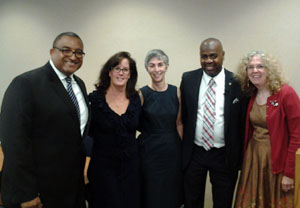Site Search
- resource provided by the Forum Network Knowledgebase.
Search Tip: Search with " " to find exact matches.
Alexis Bivens, Vice President of Strategic Initiatives and Managing Director of the Supporting Organizing Work Funders Collaborative, Connecticut Council on Philanthropy, presents the process and progress of how an affinity group transformed into a funders collaborative, how it was resourced, and challenges along the way.
Food is essential. But how often do you consider where your food comes from?This issue of What Funders Need to Know from the Washington Regional Association of Grantmakers explores the stages of the food system, from production all the way to disposal. Why is this important to philanthropy?
Because hunger, food insecurity, nutrition-related chronic disease, the health of resource lands and waterways, wages, and equal opportunity in the food economy all converge in our regional food system.
A CNJG member received an application from a school district, and wanted to know if others granted funds to a school district, and what other funders learned from granting to a district.
A CNJG member queried the Health & Aging listserves asking for sample letters of inquiry. This document includes a few responses from fellow members. If you would like to add yours to this list, please email us.
CNJG’s first-ever Policy Agenda that includes our approach to the policy work, and five policy priorities.
The Inclusive Growth ScoreTM provides local planners, governments and impact investors with a clear, simple view of social and economic indicators for any census tract in the United States.
Novartis benchmarked Employee Crisis Programs, and asked fellow corporate funders via the corporate funders listserve to answer the questions below.
- If you have an Employee Crisis Program, what is the name
- Do you manage the program internally or thru a 3rd party? If you use a 3rd party, can you share their name/website and any good/bad experiences.
- Do you only support disasters or other hardships as well?
- What is the average percentage of your employees that apply for aid?
- What is your minimum and maximum funding?
- What is the average amount of aid?
- Do you provide aid directly to the employee and/or vendors?
- Do you allow employees to donate to your fund? If so, how do you promote awareness and what is the employee donation participation rate? Do you match these donations?
- Where does the program reside (CSR, Foundation, HR)?
- Please share guidelines and applications, if possible.
- Please share any other insights.

Join us for an informative session with Justin Scheid, New Jersey Field Office Director at the US Department of Housing and Urban Development. The Field Office manages a range of important programs and special initiatives, including Opportunity Zones, EnVision Centers, Section 3 economic opportunities, Promise Zones, ConnectHome, and homelessness.
During this discussion, Justin Scheid will share updates on CARES Act Funding and other HUD related programs and resources critical to COVID recovery and relief. We’ll also discuss strategies for philanthropy to partner with HUD to leverage resources and maximize impact in local communities.
Cost: Free for CNJG Members. $50 for Non Member Grantmakers
Webinar Video
At a time when nonprofits and philanthropy were needed the most, the pandemic forced most social sector organizations to go fully or partially remote. As we enter 2021, it seems that many organizations will continue to operate virtually for some time, and others are even considering what it would be like to make this transition permanently.
During this informative webinar session, Christine Michelle Duffy, Director of the New Jersey Program at Pro Bono Partnership, and Christopher Petermann, Partner at PKF O’Connor Davies, will share practical suggestions, policies, and procedures that nonprofits and foundations should consider when some or all of their workforce is working remotely. We’ll also discuss the major challenges that nonprofits have faced when adapting to this new virtual world, and how philanthropy can help its grantee partners moving forward.
Anyone interested in providing a remote work option for employees, going fully virtual for the long-term, or supporting nonprofit operations in the current context will want to attend this webinar.
Cost: Free for CNJG Members; $50 for Nonmember Grantmakers
Webinar Video
